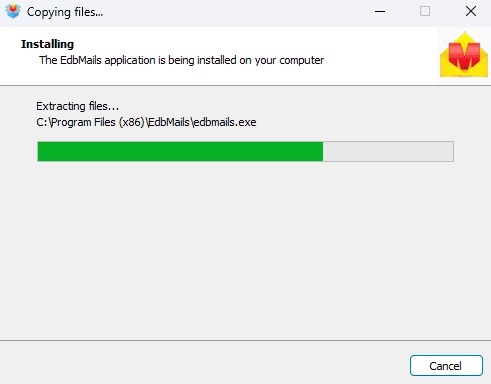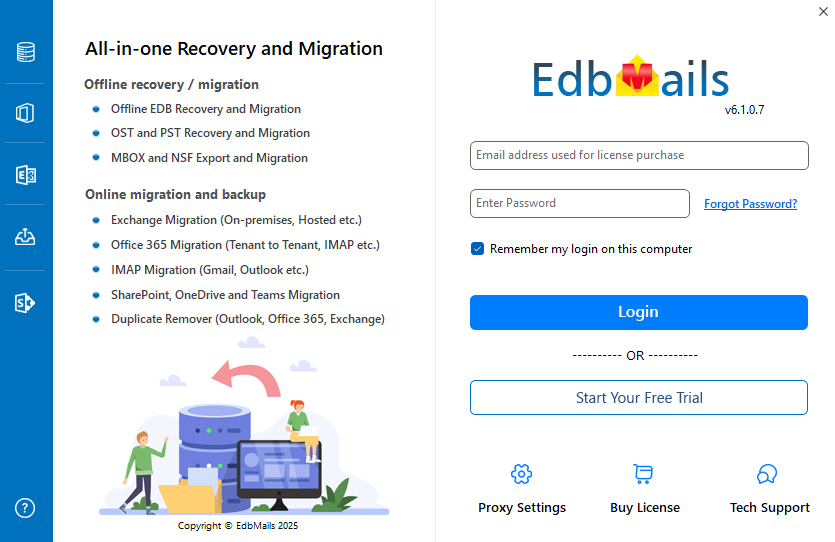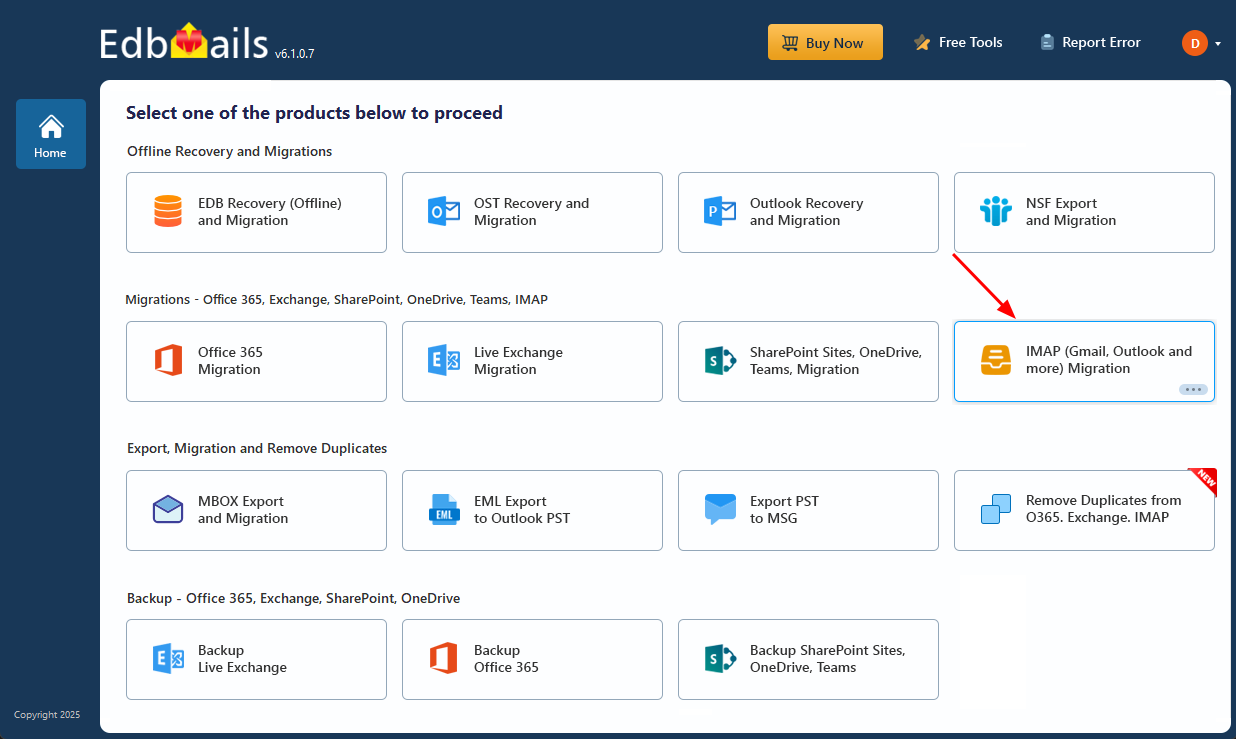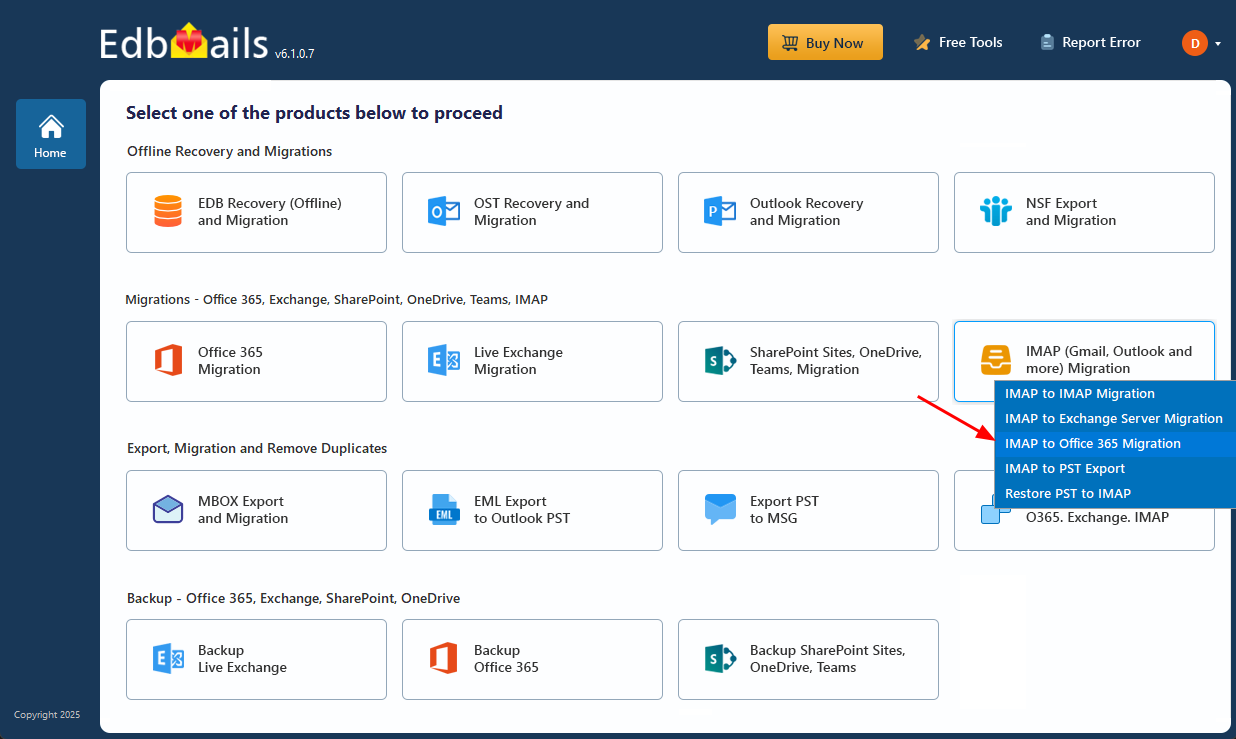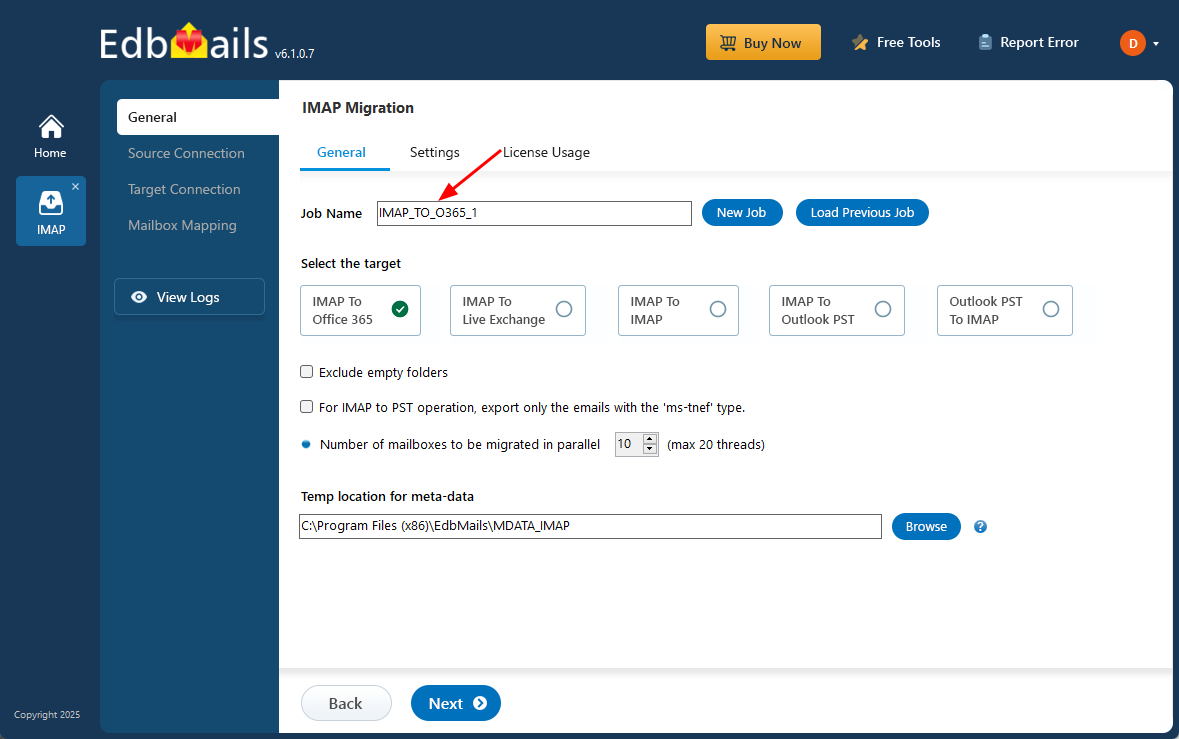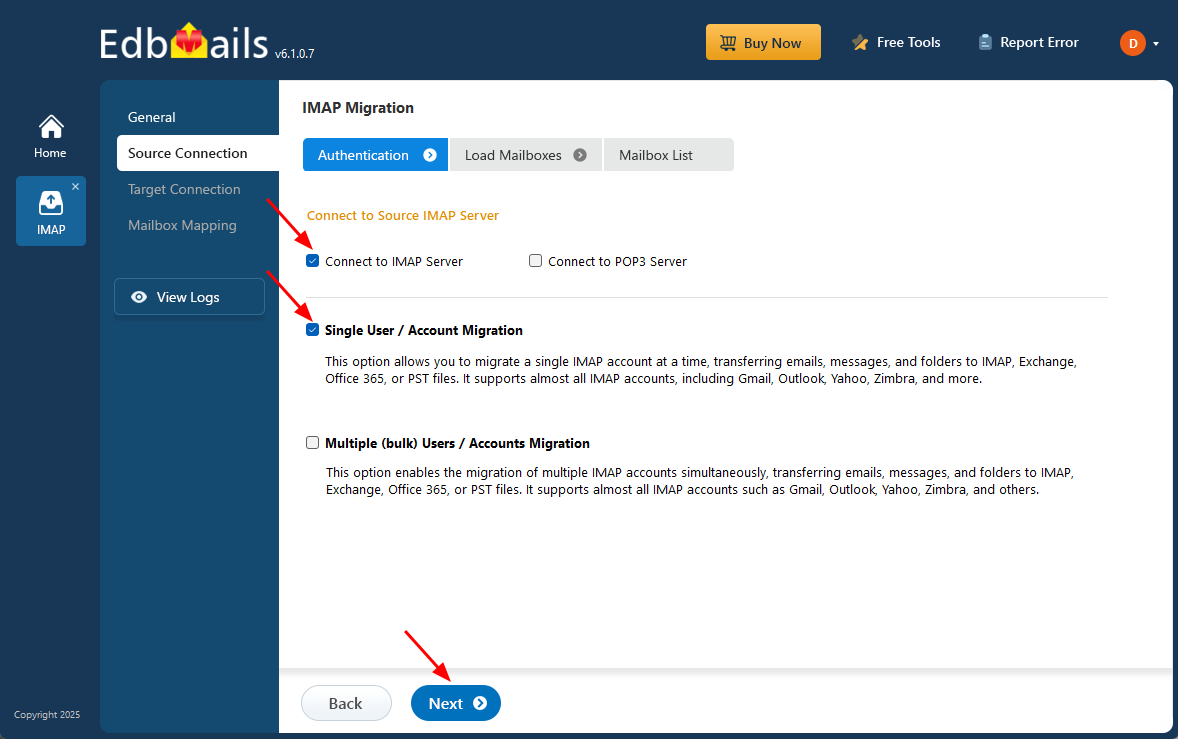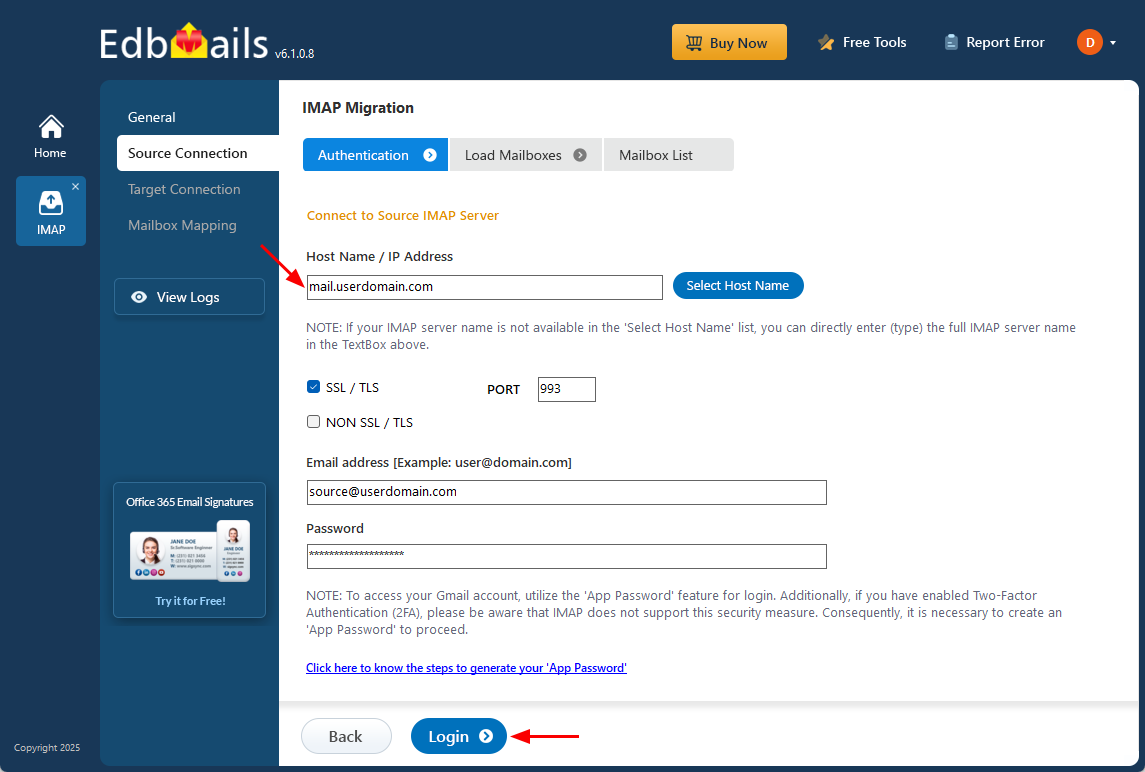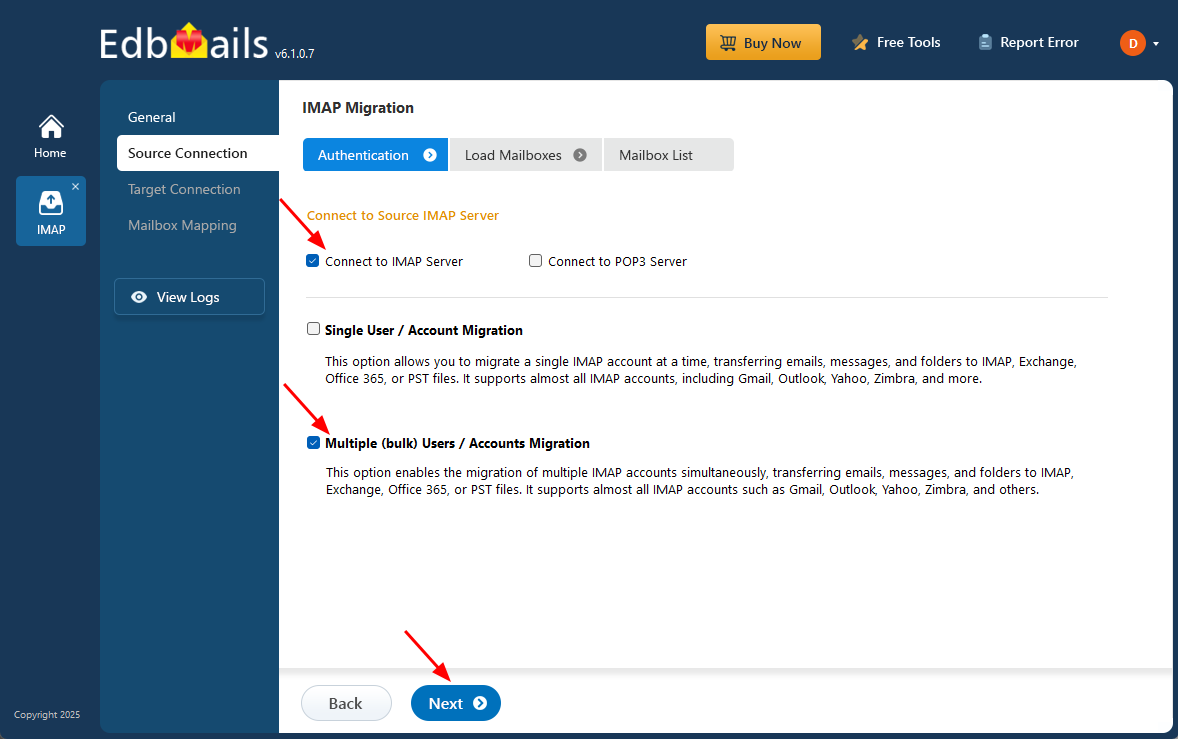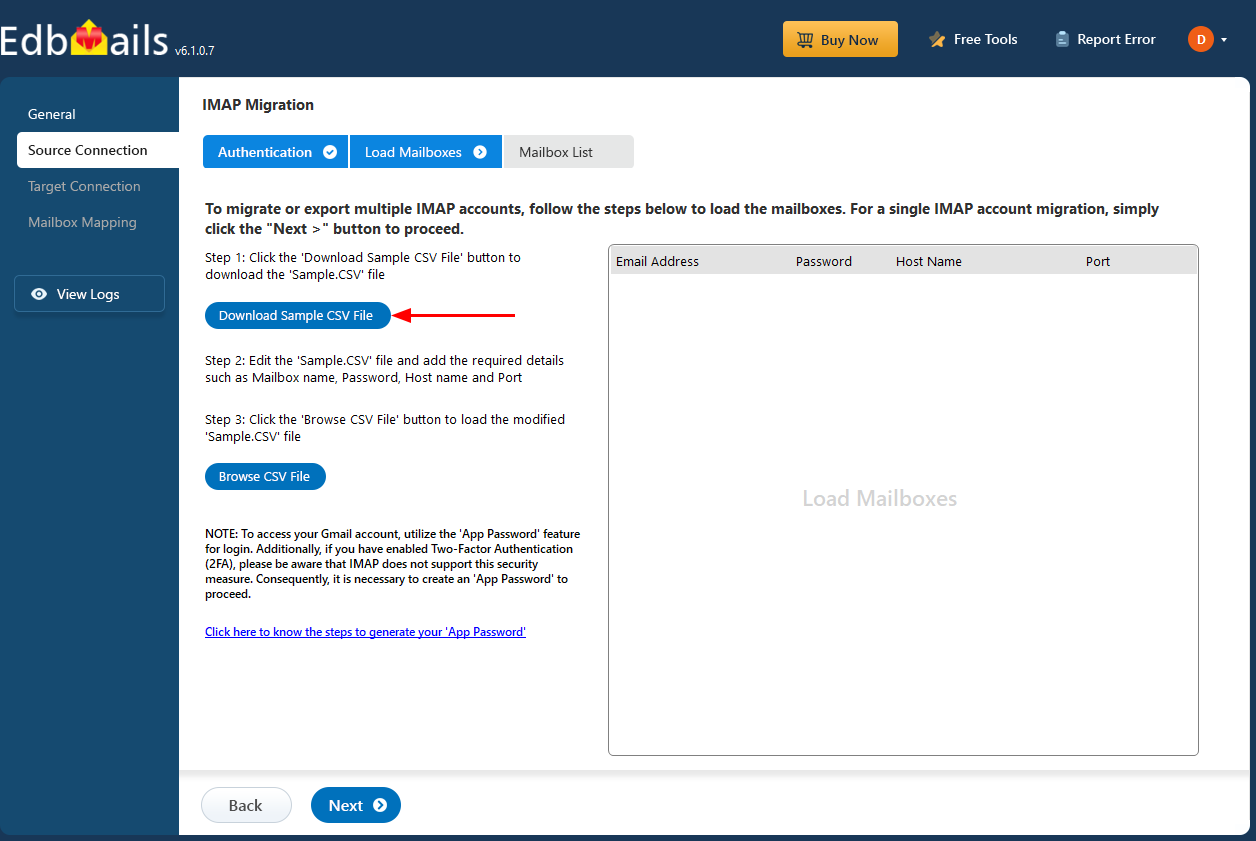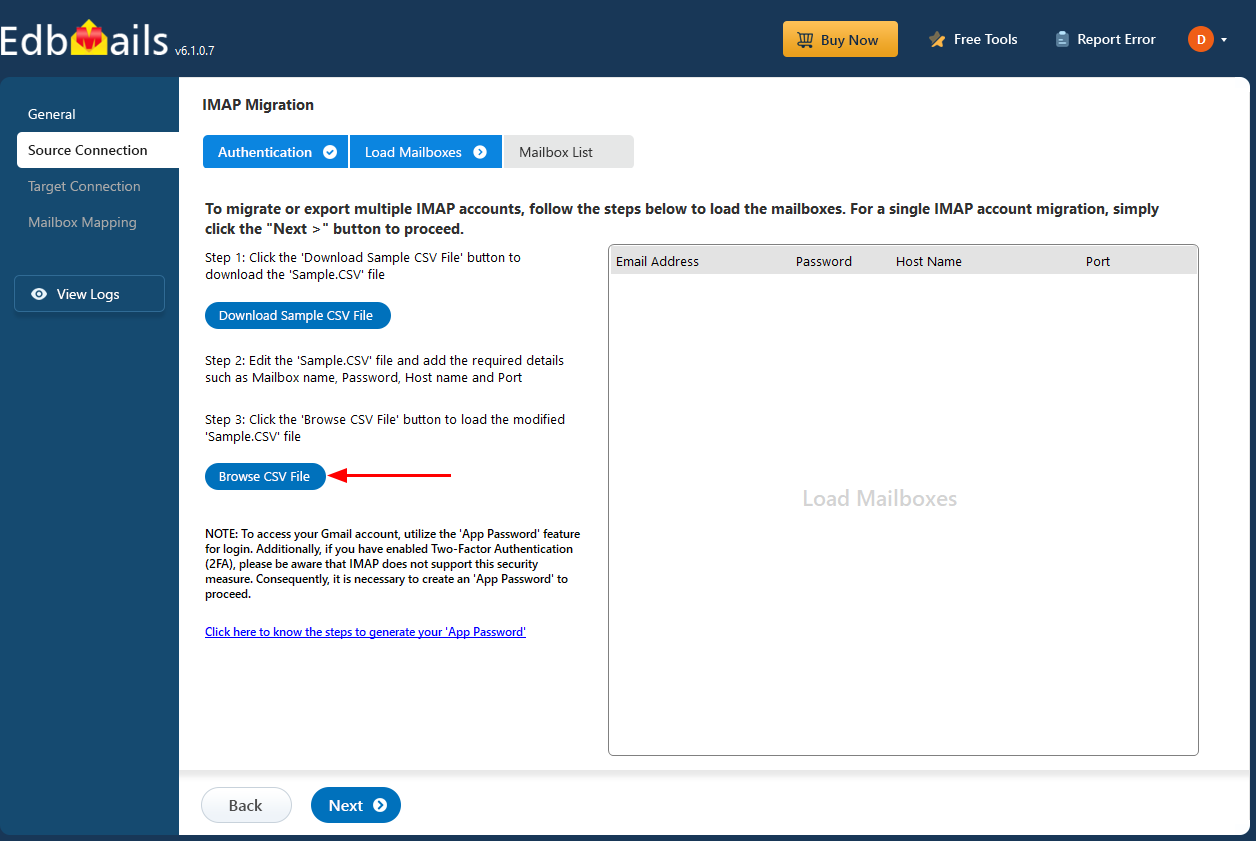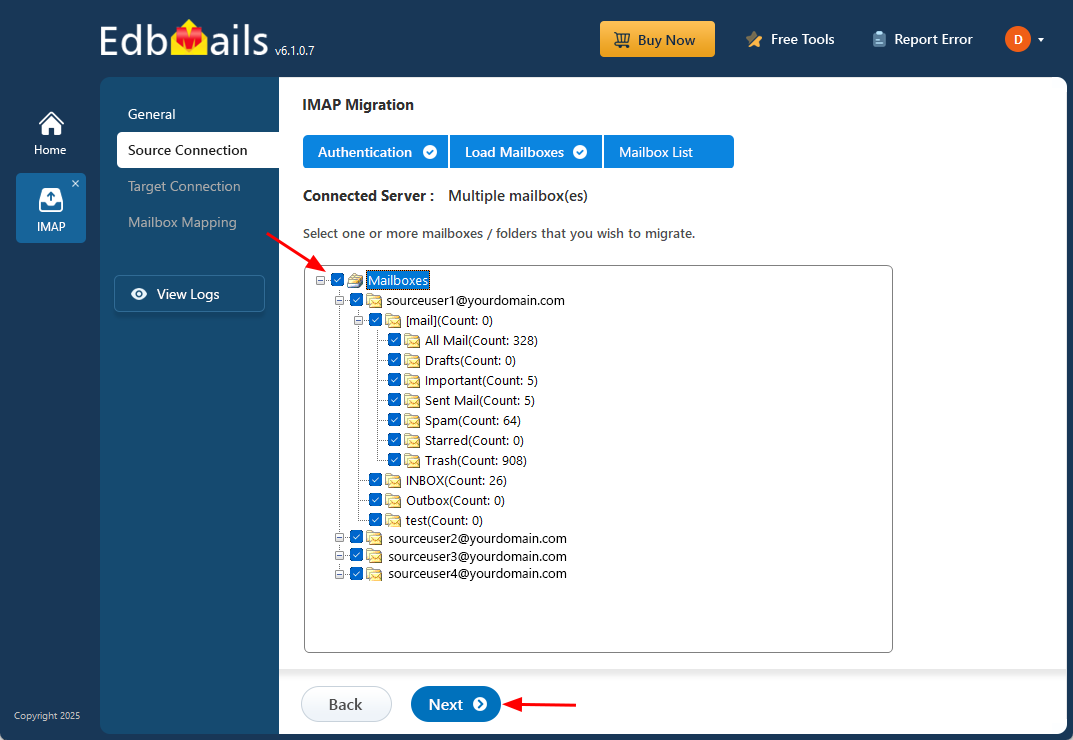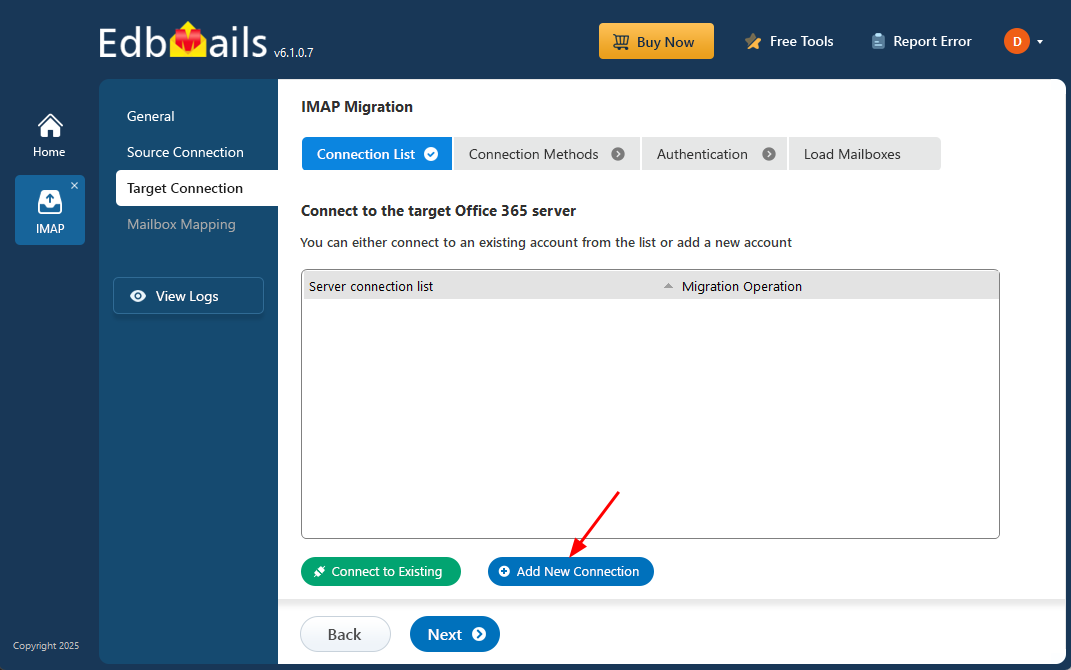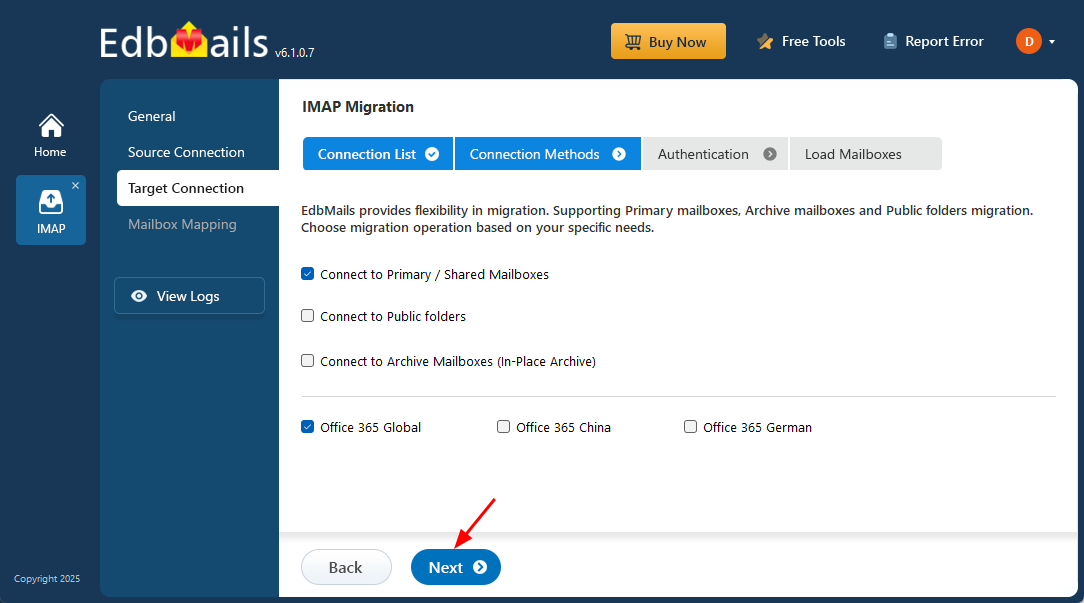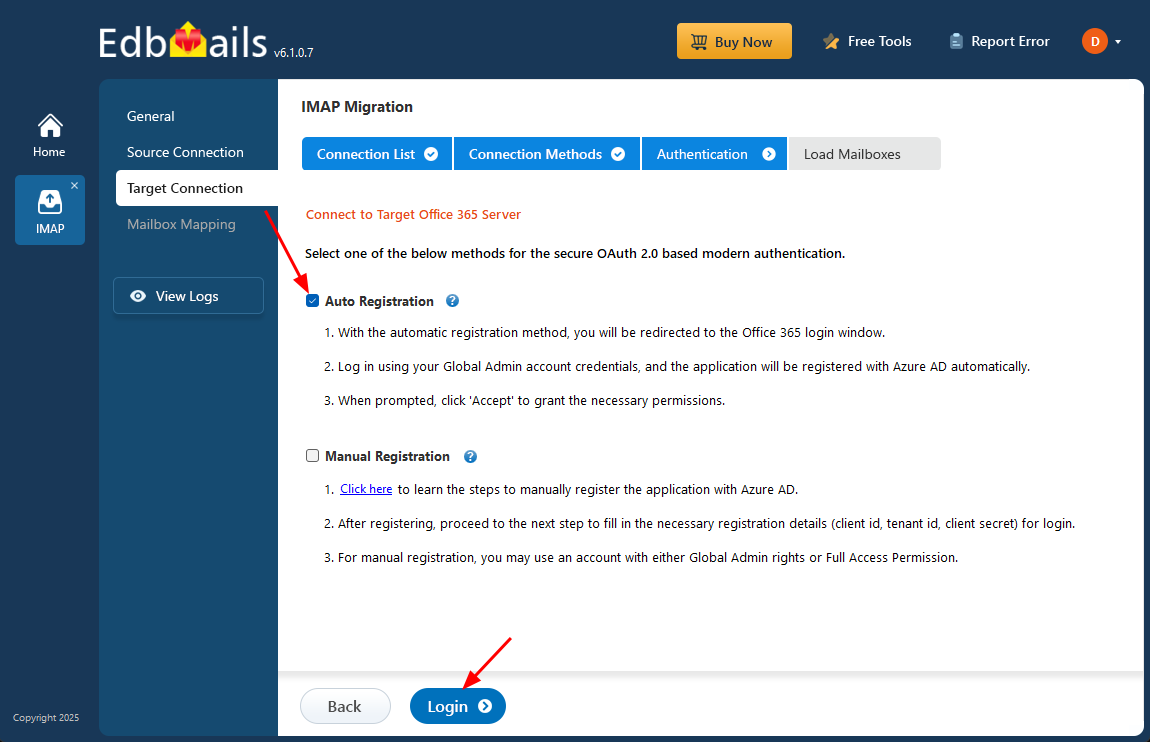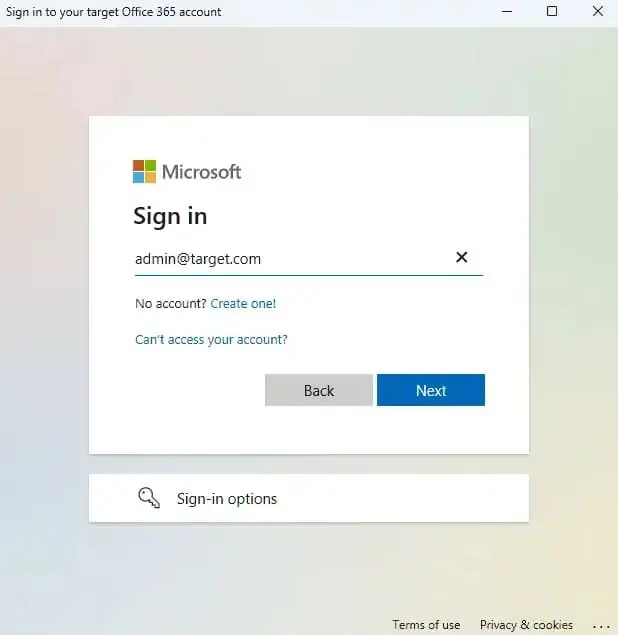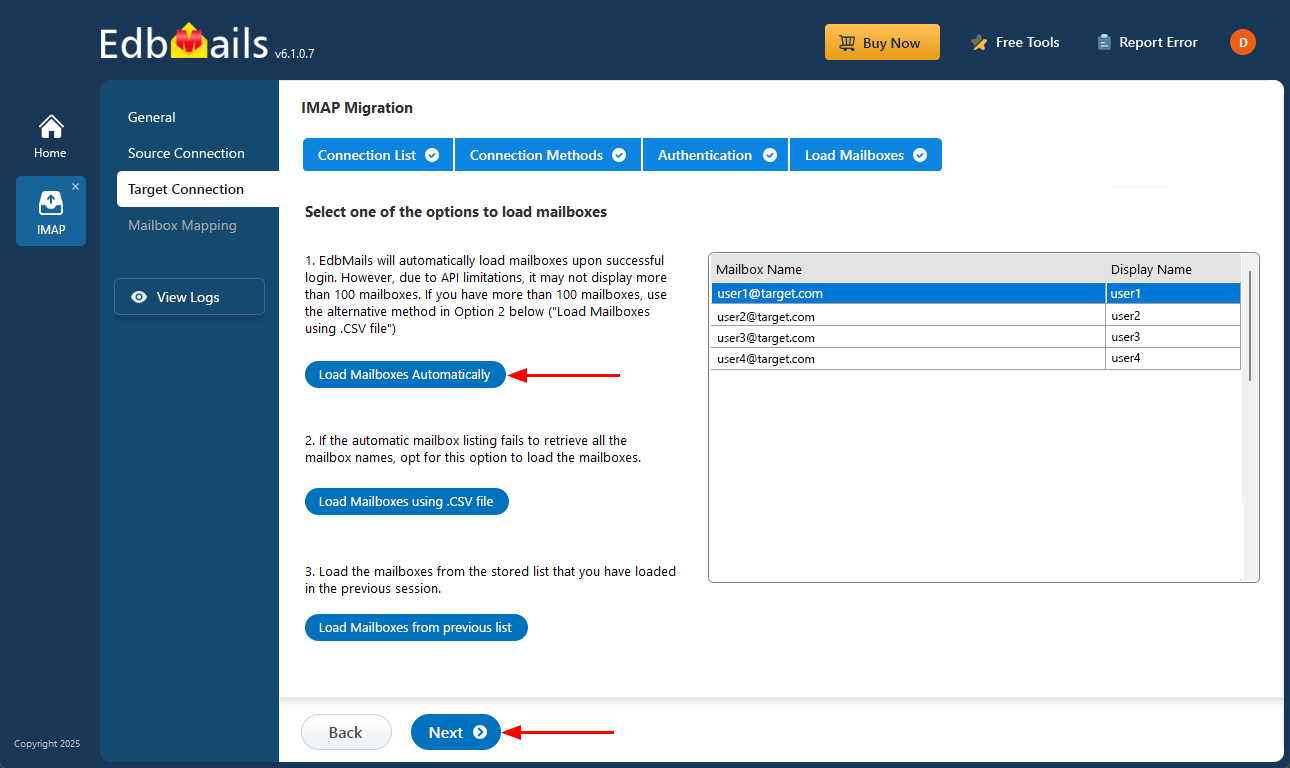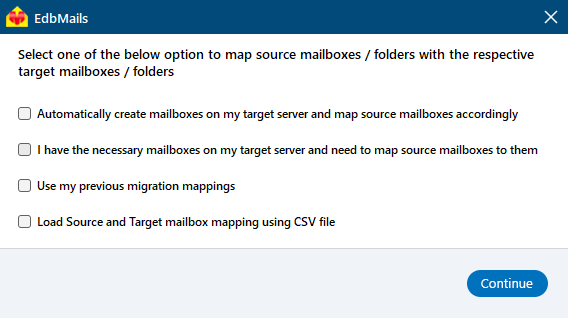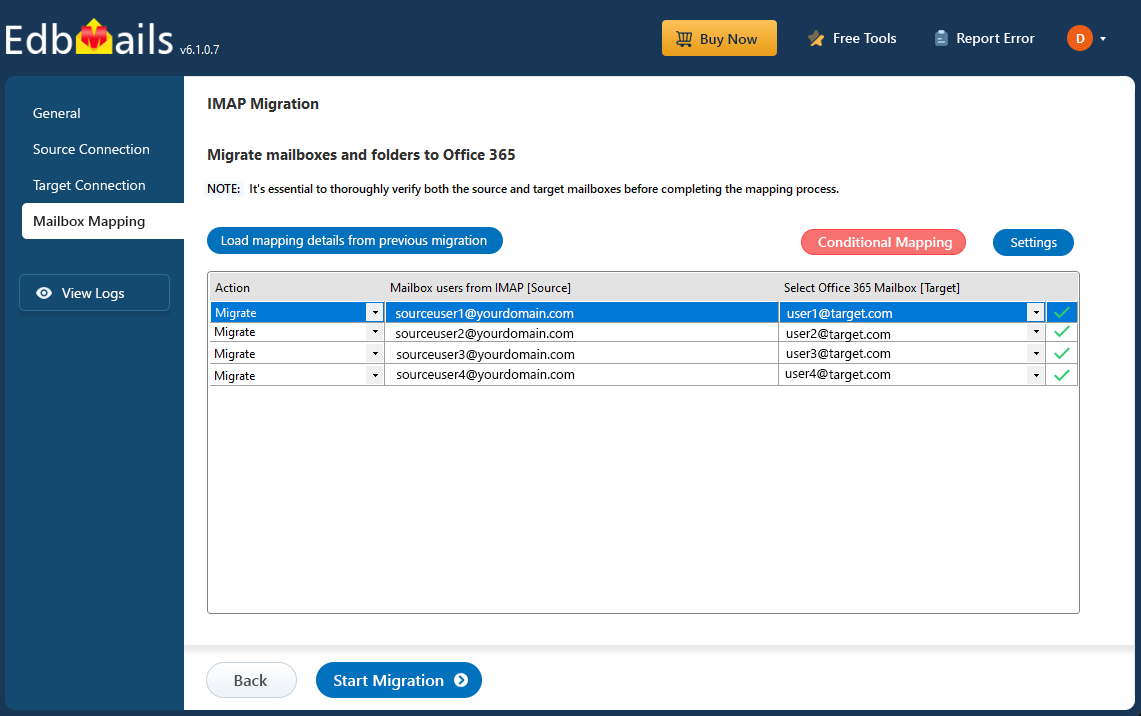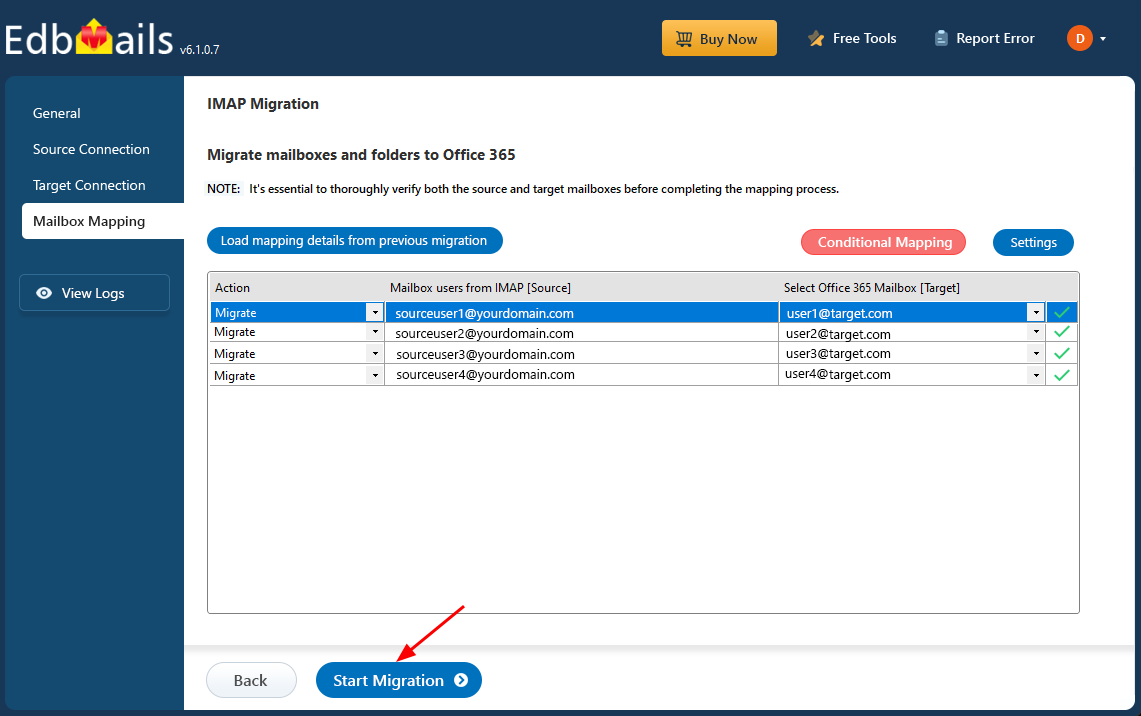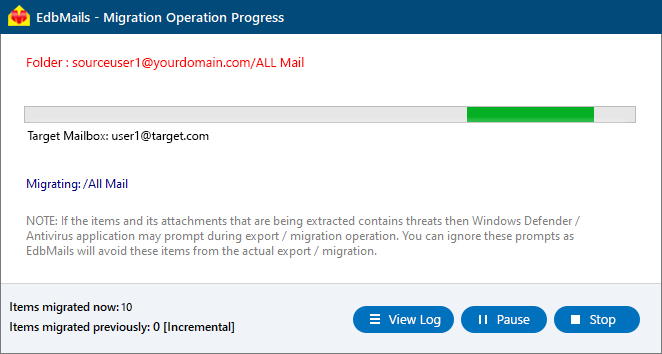Hostgator email to Office 365 migration
HostGator has long been a trusted email hosting provider for small and medium-sized businesses, offering domain-based email accounts and essential communication features. However, as organizations expand, the demand for advanced security, collaboration, and scalability grows - areas where traditional hosting solutions like HostGator may have limitations.
Microsoft 365 (formerly Office 365) provides a comprehensive, cloud-based ecosystem that meets these modern business requirements. It combines enterprise-grade email through Outlook, collaboration tools like Teams, and productivity apps such as Word, Excel, and OneDrive - all tightly integrated for seamless communication and workflow management.
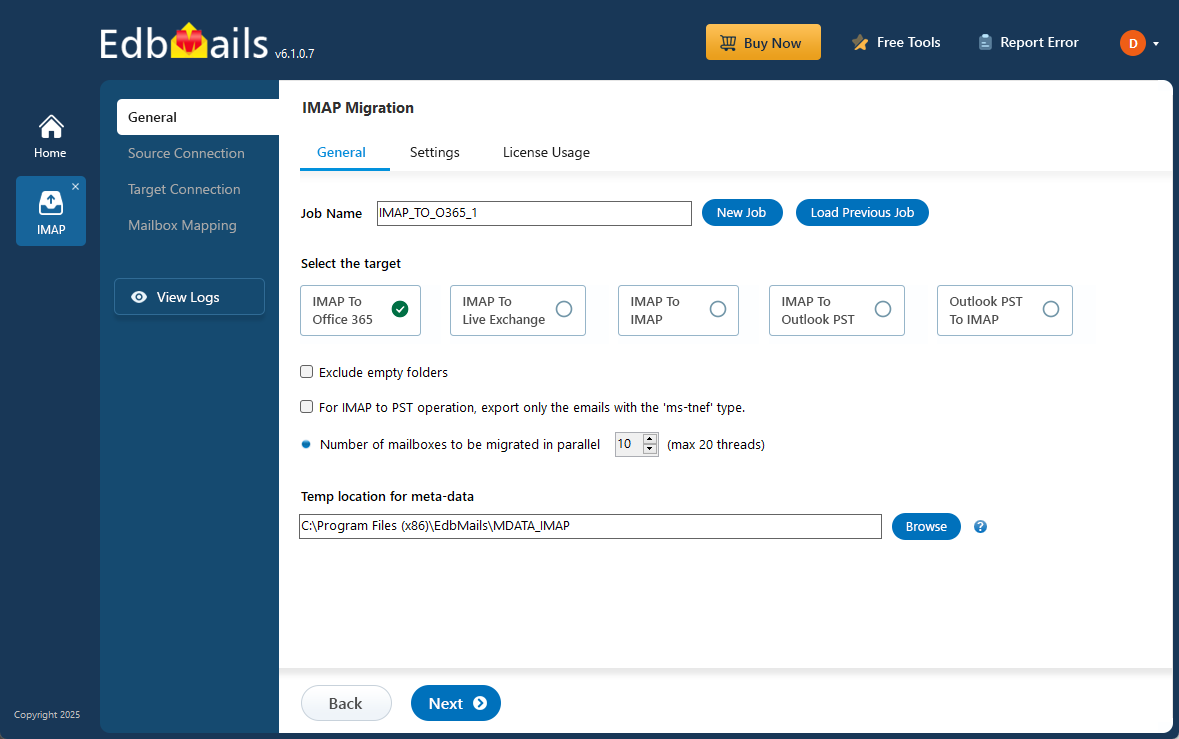
To ensure a secure and efficient migration from HostGator to Office 365, EdbMails IMAP Migration Tool offers an all-in-one, automated solution. It enables direct mailbox migration with features like secure OAuth-based authentication, automatic mailbox mapping, zero downtime, and incremental migration to prevent duplicates.
This guide explains the benefits of migrating from HostGator to Microsoft 365 and demonstrates how EdbMails can help you complete the transition smoothly, securely, and without data loss.
Reasons to migrate email from HostGator to Office 365
Here are the key reasons why businesses migrate from HostGator to Office 365:
- Limited email sending capacity: HostGator’s shared hosting plans restrict outgoing email to 500 messages per hour, which can create performance bottlenecks for organizations that manage high-volume communications, automated notifications, or large mailing lists.
- Restricted mailing lists: HostGator blocks mailing lists with over 900 email addresses during peak hours, which can disrupt marketing and customer communications.
- POP check limitations: HostGator restricts each IP address to 30 POP email checks per hour, which limits synchronization frequency and reduces flexibility when managing emails across multiple devices or email clients.
- Scalability challenges: HostGator’s email service is ideal for small businesses but may struggle to meet the demands of growing companies. As businesses expand, they require more robust and scalable solutions, such as Office 365, to support their evolving needs.
- Comprehensive productivity suite: Office 365 (Microsoft 365) offers not just email services but also a suite of tools like Word, Excel, PowerPoint, Outlook, and Teams, enhancing collaboration, communication, and business operations.
- Cloud-based access: Microsoft 365 enables users to securely access emails, calendars, contacts, and other business data from any device, including PCs, Macs, tablets, and smartphones. It also provides offline access, ensuring uninterrupted productivity even without an internet connection.
- Regular updates and security: Office 365 is regularly updated with new features, security enhancements, and bug fixes, ensuring businesses always have access to the latest tools and protection.
- Flexible subscription plans: Office 365 offers various subscription plans that allow businesses to choose the most suitable one based on their specific needs, unlike HostGator’s fixed email services.
These reasons highlight why migrating from HostGator to Office 365 using EdbMails is a smart choice for businesses aiming to scale and enhance their productivity.
Challenges in migrating from HostGator to Office 365
Here are the key challenges in migrating from HostGator to Office 365:
- Data migration complexity: Moving email data from HostGator to Office 365 can be challenging due to differences in server architecture, authentication methods, and data storage formats, which may lead to configuration issues or data inconsistencies if not handled properly.
- Email downtime during transition: Minimizing downtime during migration is essential to avoid communication disruptions.
- Ensuring data integrity: Ensuring data consistency and accuracy during migration is crucial to prevent data loss or corruption.
- Configuration issues: Configuring Office 365 to work seamlessly with existing systems can require significant effort.
- Limited knowledge of migration tools: Lack of expertise in migration tools can lead to incomplete data transfer or email delivery issues.
- Domain and DNS settings: Misconfiguring DNS settings during migration can cause email delivery problems or spam issues.
- Security risks during migration: Ensuring secure migration protocols is crucial to protect sensitive business data from unauthorized access, data leaks, or security breaches during the HostGator to Office 365 migration process.
Professional approach for Hostgator email to Office 365 migration
EdbMails IMAP migration tool simplifies the migration process from HostGator to Office 365, ensuring that all attachments are preserved while maintaining the original folder structure and hierarchy. This user-friendly software allows even non-technical users to effortlessly complete the migration in just a few easy steps, ensuring a smooth transition to Office 365.
EdbMails enhances the migration with powerful features such as delta migration, which transfers only new or modified data, reducing unnecessary transfers and saving time. Concurrent migration enables the simultaneous transfer of multiple mailboxes, streamlining large-scale migrations. Automatic mailbox mapping eliminates manual configuration, minimizing errors. Additionally, EdbMails offers a free trial, allowing users to test the software before committing. With these features, EdbMails provides a secure, efficient, and professional solution for businesses seeking a seamless migration to Office 365.
Hostgator email to Office 365 migration plan
Planning is one of the most important steps before you begin Hostgator email to Office 365 migration. Prepare the environment and have a backup plan in place to avoid potential risks and data loss. Here is a checklist of points to consider before you migrate.
- Determine the size of the data and the number of mailboxes you want to migrate.
- Make a list of all the data and permissions from Hostgator email that you want to transfer.
- Create the necessary user mailboxes in Office 365 and assign the appropriate licenses.
- Ensure sufficient network capacity and bandwidth are available to support the migration process.
- Inform your end users about the migration plan and timeline to ensure smooth communication and minimal disruption.
Pre-migration activities for Hostgator email to Office 365 migration
- Find the IMAP server name of your Hostgator email server. You can find this information from your server’s dashboard settings or by connecting your email system to Outlook.
- Before you migrate Hostgator email to Office 365, ensure that you create mailboxes for your users in your organization and assign suitable licenses to them.
- If you plan to migrate the source Public folders to Public folders on Office 365, ensure that you create and configure the Public folder mailboxes on the target server.
Create Office 365 Public folder and assign mailbox user. - Ensure that the admin account on the target Office 365 server has the impersonation rights to migrate mailboxes and Public folders.
- If you have a custom email domain from your hosting provider to which you want to migrate and receive emails, you must add and verify the domain on Office 365.
Steps to add a custom domain to Office 365 and Steps to add DNS records to connect your domain. - Configure Office 365 to send and receive large messages.
Follow the steps to increase the message size on Office 365 to 150MB and see tips to optimize IMAP migration to Exchange online.
A step-by-step guide to migrate HostGator email to Office 365 using EdbMails
Step 1: Download and install EdbMails IMAP migration software
- Download EdbMails and install the application on any computer running on Windows OS that is connected to the source and target environment.
See a detailed list of EdbMails system requirements for IMAP migration.
- Launch the application and click 'Login' or 'Start Your Free Trial'.
- Select the option ‘IMAP (Gmail, Outlook & more) Migration’.
- Select ‘IMAP to Office 365 Migration’.
- You can either keep the default job name or select ‘New Job’ to define a custom name.
- Download EdbMails and install the application on any computer running on Windows OS that is connected to the source and target environment.
Step 2: Connect to source Hostgator server
- To migrate a single user account, choose ‘Single User / Account Migration.’ Next, select the desired protocol, like ‘Connect to IMAP’ or ‘Connect to POP3,’ and click ‘Next’ to move forward.
- Choose the correct IMAP host name from the list or manually enter it (e.g., mail.yourdomain.com). Then, fill your email address, password.
- Click the ‘Login’ button.
- For migrating multiple Hostgator mailboxes, select ‘Multiple (Bulk) Users/Accounts Migration’ and click ‘Next’.
- Click on ‘IMAP Migration CSV File’ to get a ready-made template. You can use this file to enter mailbox details such as email addresses, server names, and login credentials for bulk migration setup.
- Edit the CSV file to include the necessary details such as the email address, password, IMAP host name, and port number. Once updated, save the file to apply the changes before proceeding with the migration.
- After updating the CSV file with the necessary details—such as email addresses, passwords, IMAP hostnames, and port numbers—save and close the file to apply the changes.
- Next, click on the 'Load Modified CSV File' button within the application. Navigate to the location of your updated CSV file, select it, and open it to proceed with the migration process.
Step 3: Select source Hostgator server mailboxes
- Select the mailboxes or specific folders you want to migrate, then click ‘Next’ to proceed with the migration process.
Step 4: Connect to target Office 365
- Click the ‘Add New Connection’ button to establish a new connection to the target Office 365. To use the previous connection, select it from the connection list and click the ‘Connect to Existing’ button to proceed.
- Select the required connection options and click the ‘Next’ button.
- Select the authentication method and click the ‘Login’ button to continue.
- Authenticate on Microsoft sign-in page.
- Click the ‘Next’ button to continue.
Step 5: Hostgator email to Office 365 mailboxes mapping
- Select the mapping option that best aligns with your requirements.
- You can choose to let EdbMails automatically create mailboxes in Office 365 and map them between the source and target servers. This feature is especially useful for large-scale migrations, saving time, reducing manual effort.
Step 6: Start Hostgator email to Office 365 migration
- After mapping the mailboxes, click the ‘Start Migration’ button to initiate the migration process.
- Click the ‘View Log’ button to view the migration report, which includes mapping details and the total count of migrated emails.
- Login to your target server and verify the migrated items.
Hostgator email to Office 365 post-migration tasks
- Step 1: Update the MX records to point to Office 365
If you have not done this step previously, change the DNS records known as MX records to enable email and receive messages on the target Office 365 server. In addition, configure the Autodiscover record to allow Outlook to connect to the migrated mailboxes.
- Step 2: Create a new Outlook profile for users in the new domain
Configure the Outlook profile for each user in your domain if Outlook has problems connecting to Office 365 mailboxes.
- Step 1: Update the MX records to point to Office 365
Hostgator email to Office 365 migration troubleshooting
For troubleshooting, check out our knowledge base articles. If you have additional questions, browse the FAQs or engage with our customer care team for personalized assistance.
Advantages of EdbMails to migrate hostgator email to Office 365
- Easy-to-use utility for seamless migration
EdbMails simplifies the HostGator email to Office 365 migration with an intuitive interface designed for users of all skill levels. Its user-friendly dashboard ensures that even non-technical users can easily navigate and complete the migration process without complications, ensuring smooth results.
- Selective migration for better control
With EdbMails, you can select specific emails, folders, or data items to migrate. This feature allows businesses to transfer only the necessary data, reducing clutter in Office 365 while speeding up the overall migration process.
- Secure and reliable data transfer
EdbMails ensures top-tier security throughout the migration, safeguarding sensitive email data with encryption and preventing unauthorized access. This level of security gives businesses peace of mind, knowing their data remains safe during and after migration.
- Fast and simple process
EdbMails simplifies the entire migration workflow from initial configuration to final completion using fast, efficient tools that minimize downtime and ensure uninterrupted business operations. This makes it an ideal solution for time-sensitive email migrations.
- Compatible with all versions of Windows OS
EdbMails is fully compatible with all major Windows operating systems, including Windows 11, 10, 8, and 7. This broad compatibility ensures users can perform migrations without system-related limitations, delivering a smooth and error-free experience across both older and modern Windows environments.

